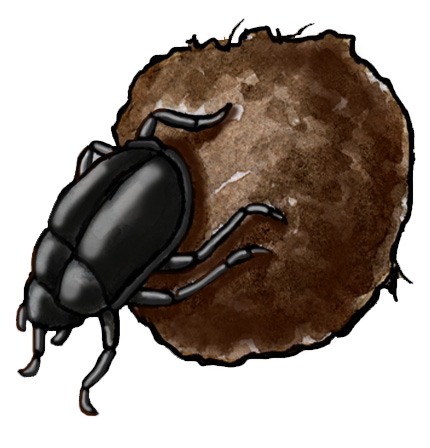

There are several different kinds (species) of dung beetle in Africa and thousands of different kinds all over the world, wherever there is dung.
The African Dung Beetle (Neateuchus proboscideus) lives on the grassland (savannah).
They are large, black beetles, about an inch long. Adult dung beetles have mouth parts which are made to feed on plant and animal matter that has rotted down to a liquid. They can also break down dry dung.
Dung beetles roll dung into a ball. They can be seen rolling them across open areas. They bury the balls or pack them into burrows. Breaking down dung helps the environment by stopping flies from breeding in the dung and releases the dung's nutrients into the soil, like fertilizer.
They eat the dung but will also eat mushrooms and rotting plant matter.
A female beetle lays eggs in a dung ball that she and a male beetle have rolled down into a burrow that they have dug. The eggs hatch and the young feed on the dung around them.
Kingdom: Animalia
Phylum: Arthropoda
Class: Insecta
Order: Coleoptera
Suborder: Polyphaga
Family: Scarabaeidae
Genus: Neateuchus
Species: N. proboscideus
When you research information you must cite the reference. Citing for websites is different from citing from books, magazines and periodicals. The style of citing shown here is from the MLA Style Citations (Modern Language Association).
When citing a WEBSITE the general format is as follows.
Author Last Name, First Name(s). "Title: Subtitle of Part of Web Page, if appropriate." Title: Subtitle: Section of Page if appropriate. Sponsoring/Publishing Agency, If Given. Additional significant descriptive information. Date of Electronic Publication or other Date, such as Last Updated. Day Month Year of access < URL >.
Amsel, Sheri. "Beetle (African Dung)" Exploring Nature Educational Resource ©2005-2024. December 13, 2024
< http://www.exploringnature.org/db/view/294 >

